- Home
- Jane Peart
A Tangled Web Page 8
A Tangled Web Read online
Page 8
Clemmie looked at her in astonishment as Darcy continued laughing. Then a slow smile overtook Clemmie’s startled expression.
“Well, thank goodness. I’m glad to see that underneath all that piety, the real Darcy Welburne is there after all! I was beginning to think I’d better mend my own ways, rooming with an angel!”
Both girls laughed. However, this little exchange gave Darcy pause. Saved or not, she had not been honest with Clemmie. Clemmie didn’t know the real Darcy. She had never told her about keeping her job as a Harvey Girl secret from her family. She was afraid it might hurt Clemmie to find out they would look down on an occupation Clemmie was proud of, considered to be the best thing that had ever happened to her. Also, she was afraid that Clemmie, who was the soul of honesty, would despise her for lying. To clear her conscience, she had to confess. This was as good a time as any.
“Clemmie, there’s something about me you ought to know. Something I’ve been meaning to tell you.”
Clemmie consulted her pendant watch pinned under her apron bib. “Can it wait? We’d better get down to the dining room. It’s only a half hour until the next train.”
So the opportunity to tell Clemmie passed. Darcy let it pass. She felt some relief. Maybe it could wait. Was there really any need to tell her? Clemmie would never meet her family. So Darcy decided not to bring it up again. It was a wrong decision, one she would regret.
That night the Edistons arrived on the evening train and came into the restaurant for dinner. Darcy thought Mrs. Ediston looked tired. She seemed drawn and pale. Her pallor accentuated her fragility. But she greeted Darcy warmly.
“It’s so wonderful to be back and to see you, Darcy. Washington seems to be getting an early start on summer. The weather has been miserable, hot and humid.”
The following day Mrs. Ediston came alone into the dining room and sat at Darcy’s station. She looked more rested and seemed to have lost the weariness of the night before. She also was animated as she confided, “The senator’s gone out to our land. He’s meeting with our architect, who arrived this morning, and went to see the site he’s selected for our house.”
“That’s wonderful. I’m so happy for you,” Darcy said. The new house and the prospect that her hectic social life in Washington would soon be over, and that she could settle down here in the place she loved, had obviously given Mrs. Ediston a new lease on life.
However, there was something else on Mrs. Ediston’s mind that day, and she was quick to share it with Darcy.
“Darcy, we don’t want to put any pressure on you or ask a favor you wouldn’t want to refuse, but the senator and I have been discussing this since the last time we were here, when we got to know you. It seems such a good idea that I’ll just ask if you’d be interested. All you can do is say no.” Mrs. Ediston smiled but her eyes were anxious.
“Of course, Mrs. Ediston, you know I’d be happy to do anything for you.”
Mrs. Ediston held up a graceful hand. “Wait until you hear what it is before you agree.” She paused. “The senator has to return to Washington. But we’ve decided that it would be best for me to remain here so I could consult with our architect and supervise the work and make some of the decisions as our house is being built. However, Roger believes I need someone, a companion.” She paused again. “We were thinking of you, Darcy. I know you enjoy your work here at the Harvey House, but we thought perhaps you could take a leave of absence—say for four or six months—and be my companion? It would be an ideal arrangement for me, and the senator assures me you will be well compensated. So what do you think, Darcy? Would you be too bored being an old lady’s companion, her helper?”
“You’re not an old lady, Mrs. Ediston!” Darcy declared indignantly. “And I’m flattered that you would want me. I just don’t know…”
“Well, think about it. Pray about it. If it seems the right thing to do, we would be so happy.” Mrs. Ediston spotted her husband entering the restaurant. “Here comes Roger.”
The senator came over to the table. “Someone will be joining us,” he announced. Then, inclining his head toward Darcy, he asked his wife, “Have you spoken to Miss Welburne yet?”
“Yes. She’s going to think about it.”
“There’s someone you should meet,” the senator said to Darcy. “If you become Mrs. Ediston’s companion, you’ll be seeing a lot of him. The architect who is designing our house.” The senator looked over Darcy’s shoulder to the entrance of the restaurant. “Here he is now.”
Darcy turned and to her amazement saw Ted Shepherd approaching their table.
FIFTEEN
At first Darcy was too startled to react. Ted was smiling that slow, shy smile of his as Mrs. Ediston said, “Darcy, may I introduce Ted Shepherd, our brilliant architect. Ted, this is my friend and hopefully my companion, Darcy Welburne.”
All Darcy could think was, What an amazing coincidence. Another one in her life that seemed filled with such unexpected happenstances. Mrs. Ediston looked from one to the other, then with a knowing smile said, “Why is it I have the feeling no introduction is needed? Do you two happen to know one another?”
“Well, we’ve never been formally introduced,” Ted’s blue eyes were amused. “But thank you for making it official.”
“I’ve waited on Mr. Shepherd when he was here before,” Darcy explained.
Ted sat down in the chair the senator indicated, and was immediately engaged in conversation by him. Darcy busied herself pouring coffee all around. She couldn’t wait to share this surprising turn of events with Clemmie. They had sometimes wondered if Ted Shepherd would ever come back to the Redsands Harvey House.
Darcy took their order and attended the other tables in her station. When the Edistons got up to leave, Ted excused himself and came over to speak to her. Mrs. Ediston smiled and gave a little wave as she and her husband left the dining room.
“Are you really considering becoming Mrs. Ediston’s companion?” he asked.
She shrugged. “I’m not sure. I would have to get a special leave of absence. I wouldn’t want to just give up my job here.”
“I hope you can work it out. The senator confided in me that he is concerned about Mrs. Ediston’s health. Washington summers are wicked. But he doesn’t want to leave her here alone.” He paused. “They think the world of you. I know the senator would be mightily relieved if you accepted.”
“It’s good of you to be concerned about Mrs. Ediston,” Darcy murmured.
Ted looked a bit sheepish. “Truthfully, that wasn’t my only concern. I was thinking that if you do decide to take the position, there’d be no restriction on us seeing each other. We could take that horseback ride into the desert.”
Darcy’s heart gave a little thump. “Yes, I guess we could.”
“I’ll be eager to know what you decide,” he said, smiling.
She watched him leave, following his tall figure as he walked out of the dining room and into the lobby.
As she finished up her chores, straightened up her station, set up the tables for the next train arrival, Darcy thought about the Edistons’ offer.
Would the management give her a leave of absence? The summer months were not as busy at the Arizona Harvey House, so the workload for waitresses was lighter. From June to September there were less travelers coming to the hotel and restaurant. Most people found the temperature, although dry desert heat, too hot for comfort. For the most part that left only the local restaurant clientele. The Edistons’ offer interested her, especially after Ted Shepherd had made it so personal. She knew the management gave many of the girls time off. Especially those from farm families, who went home to help at planting and harvest times. This of course was different. Still, the Edistons were honored guests, and the management might make an exception in this case. All Darcy could do was ask and see what happened.
In any case, she didn’t want to jeopardize her job. That thought wouldn’t have crossed her mind less than a year ago. But now she was so thoroughly a Harvey Girl, that wa
s her priority.
Mrs. Ediston had suggested that Darcy think and pray about it. Well, she’d taken half of her advice, anyway. She still felt a little guilty about praying, but she was trying to get over it.
Until she knew if she could get permission to accept, she decided not to mention it to Clemmie. After all, they’d promised to stick together on anything relating to their jobs, such as requesting to be transferred to the same location. If she became Mrs. Ediston’s companion, would Clemmie feel Darcy was deserting her? Best to talk to the head waitress first, then tell Clemmie. But this was another mistake.
Eager to share with Clemmie the news about Ted Shepherd’s return, she burst into their room. Clemmie was sitting on her bed reading the Ladies’ Home Gazette. Before Darcy could say anything, Clemmie gave Darcy a furious look and, shaking the magazine at her, demanded,“So that’s what you think of being a Harvey Girl?”
Puzzled, Darcy asked, “What do you mean? I don’t know what you’re talking about. Why are you so angry?”
Clemmie held the issue up so that Darcy could see the headline. In bold black letters across the top of the page marched the words “Harvey Girls Tame the Wild, Wild West.”
For a split second Darcy stared at it. Then she saw the byline: Clara Bingham. It all came racing back to her in a flood. Of course. All the bantering conversations, the laughter. All in good fun. Darcy had never thought much about it. The journalist had enjoyed hearing about some of the mishaps, the inside jokes, the behind-the-scenes near-disasters at the restaurant. Thinking back, Darcy remembered she had babbled about all sorts of things as she served Clara Bingham her meals. Not a good idea, as it turned out. Harvey Girls were not supposed to engage in personal conversations with the diners. She had breached one of the rules of proper interaction with customers.
“Is it so awful?” Darcy sounded defensive but worried. “What does it say that’s so terrible?”
“Here, read it yourself.” Clemmie thrust her copy of the magazine at Darcy, then stormed out of the room.
Darcy’s knees felt weak, and she sat down on the edge of her bed and started to read the article. On the whole it was a complimentary piece, with positive comments about the food, the atmosphere, the service, the attractive waitresses. There were only a few paragraphs Darcy wished Clara had not written. Although they were not attributed directly to her, Darcy recognized her own words. She searched for the ones to which Clemmie could have taken exception.
My regular server, a pretty girl of evident intelligence and refinement, confided that her family back east did not know she was working as a waitress. She told me, “They would have a fit, feeling as they do that a waitress is on a lower social rung. But some of the others feel it’s better than being a housemaid or laundress or working in a factory.”
Darcy shook her head. She wished she had bitten her tongue before saying any of this. No wonder Clemmie’s feelings were hurt. But what was done was done. What could she do to make amends?
Nothing, as it turned out. The more she tried to smooth things over, the angrier Clemmie got.
“Please let me explain,” Darcy began when Clemmie returned to their room to dress for the evening dinner duty.
“What’s to explain?” Clemmie retorted. “It’s all there in black and white. You’re ashamed to tell your folks you’re a Harvey Girl. Ashamed! How do you think that makes me feel?”
“But Clemmie, you don’t understand…”
“Oh, I guess I’m too stupid.”
“Of course not. I didn’t mean—”
“Save your excuses, Darcy. I don’t need them. And I’m not sure I’d believe them anyway. Anyone who would lie to her own family!” Her indignation seemed to leave Clemmie at a loss for anything further to add. She grabbed up her clean apron and flounced out the door, letting it bang behind her.
Darcy was devastated. She’d done a foolish thing and hurt the best friend she’d ever had. How could she make things right between them again?
She tried. After they finished their shift and came back to the dormitory, Darcy made another attempt.
Clemmie proceeded to get ready for bed, maintaining a stony silence.
“If you’d just give me a chance to tell you how it happened, Clemmie,” Darcy pleaded. “I never dreamed Clara Bingham would use any of the things I told her. It was just so—” Darcy searched for the right word while Clemmie went on buttoning her nightgown, folding back her bedcovers.
“I don’t want to hear your feeble excuses. It’s as plain as the paper it’s written on,” Clemmie said, getting into bed.
Darcy went over to her. “Please listen, Clemmie.”
“No, I don’t want to hear anything.” She turned over and with her back to Darcy pulled her pillow over her head.
Darcy sighed deeply. Feeling terrible, she went back to her side of the room. She had often had tiffs with girlfriends in Willowdale. She and Carly had sometimes not spoken to each other for a couple of days over some minor disagreement. But it didn’t last long. They soon made up and the friendship continued as before. She hoped Clemmie would get over it. It wasn’t like her to hold a grudge. But in her heart Darcy knew this wasn’t an ordinary argument. Clemmie felt deeply and personally injured by what Clara Bingham had written—sadly enough, in an article based a great deal on what Darcy had fed her about life as a Harvey Girl.
SIXTEEN
For the next few days Clemmie rebuffed all attempts at apologies. Darcy was miserable. More and more she was beginning to think that taking the job with Mrs. Ediston would be an escape.
As Clemmie’s painful coldness continued, Darcy’s anger at Clara Bingham deepened. She felt betrayed and was determined to confront her upon her return to Arizona. The journalist was on a trip through the Grand Canyon, riding a wooden dory down the Colorado River. However, she was scheduled to come back to Redsands afterward. Darcy checked with the hotel registry and found that she had reservations for the next week.
The day of her expected arrival, Darcy was tense with anticipation. From her post in the dining room she could see into the lobby. All during the luncheon service Darcy kept an eye on the reception desk. When she saw Clara Bingham check in, Darcy felt a renewed rush of indignation.
She had to wait until the luncheon customers had finished and her table was cleared, her station put in perfect order. Then, throwing caution to the wind, Darcy marched out to the patio where Clara was sitting in the sunshine. Busily writing on a notepad, the journalist was not aware of Darcy’s approach until a shadow fell across her lap. Pen still in hand, Clara looked up.
“Well, hello, Darcy—,” she began.
But before she could finish, Darcy blurted, “How could you?”
“How could I what?” Clara seemed genuinely puzzled.
Darcy whipped out the issue of the Ladies’ Home Gazette she had folded and placed in her apron pocket, and she held it up. “This! I thought you were just showing a friendly interest. I didn’t think you would write about it!”
Clara looked surprised. “Why not? You were delighted to tell me how much you enjoyed being a Harvey Girl. I just wrote down what you told me. Is there anything untrue in that article?”
“No, but I didn’t expect to see what I’d said in print. All that personal stuff…”
“Reporters report. It was a very good story. I made you famous. I don’t know what you’re complaining about.”
“But…but…,” Darcy sputtered, then halted. Suddenly all the things she had rehearsed to say seemed without foundation. Clara was right. She hadn’t been forced to tell her anything. It had all just tumbled out. About Grady and the teaching job that had fallen through and how her family might feel.
Still, she made one last try. “Didn’t it ever occur to you that my mother and aunts might read the Ladies’ Home Gazette? That they might read about the Harvey Girl who was supposed to be teaching school but was actually waiting tables, and put two and two together and figure out it was me?”
Clara gave Darc
y an unflinching look, then said,“Well, Darcy, that’s your problem, isn’t it?”
The truth of Clara’s question stopped Darcy cold. Deflated, she turned and retraced her steps. She had no right to blame Clara. The writer may have taken advantage of her naïveté, but she herself was the one who had given her the material.
She also realized it was her own fault about how Clemmie had reacted and what would follow if her mother and aunts, whom she knew subscribed to the Ladies’ Home Gazette, read the article and identified her. She had brought all this upon herself. Her stupid letters, her own lack of honesty, her procrastination—all of this was coming back to haunt her.
Her anger against Clara Bingham drained, leaving her limp. Out of sight, Darcy leaned against the patio post, drew a long, shaky breath.
Next she would have to try again to make up with Clemmie. Whatever she had to do, she was determined to get this awful thing settled between them.
Darcy rushed up the stairs to their dormitory room. When she opened the door, she saw that Clemmie had changed out of her uniform and into a traveling suit and was packing her suitcase.
Stunned, Darcy demanded, “What are you doing?”
“What does it look like?” retorted Clemmie. “I’m packing. I’ve taken an assignment in Albuquerque.”
“You’ve what?”
“You heard me. I’m transferring to the Harvey House there.” Clemmie folded two blouses and patted them down, then closed the lid of her suitcase, buckled the strap on top, and snapped the locks.
“You were going without even telling me?” Darcy’s throat thickened with distress. “We always said we’d go together when we left here.”
Clemmie gave her a cold stare. “I wouldn’t think you’d want to be associated anymore with someone who thinks being a Harvey Girl is just a little bit better than being a laundress or a housemaid.” Clemmie’s usually mild voice was tinged with sarcasm.
“Oh, Clemmie, you know I didn’t mean that. I was just saying—”

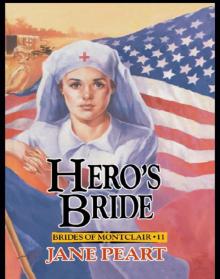 Hero's Bride
Hero's Bride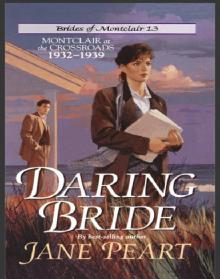 Daring Bride
Daring Bride Runaway Heart
Runaway Heart Promise of the Valley
Promise of the Valley Gallant Bride
Gallant Bride The Pledge, Value
The Pledge, Value Senator's Bride
Senator's Bride Valiant Bride
Valiant Bride Shadow Bride
Shadow Bride Destiny's Bride
Destiny's Bride A Tangled Web
A Tangled Web Folly's Bride
Folly's Bride The Promise
The Promise Mirror Bride
Mirror Bride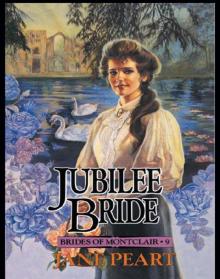 Jubilee Bride
Jubilee Bride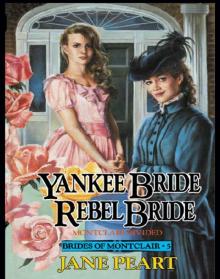 Yankee Bride / Rebel Bride
Yankee Bride / Rebel Bride A Montclair Homecoming
A Montclair Homecoming Fortune's Bride
Fortune's Bride Undaunted Spirit
Undaunted Spirit Love Takes Flight
Love Takes Flight The Risk of Loving
The Risk of Loving The Pattern
The Pattern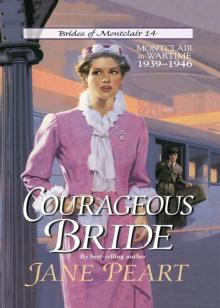 Courageous Bride
Courageous Bride